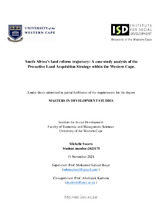| dc.contributor.advisor | Bayat, Mohamed Saheed | |
| dc.contributor.author | Swarts, Michelle | |
| dc.date.accessioned | 2022-03-15T12:21:09Z | |
| dc.date.available | 2022-03-15T12:21:09Z | |
| dc.date.issued | 2021 | |
| dc.identifier.uri | http://hdl.handle.net/11394/8895 | |
| dc.description | Magister Artium (Development Studies) - MA(DVS) | en_US |
| dc.description.abstract | The South African Constitution is built on the premise of social justice, with the intend to
“heal the divisions” of the past (RSA Government,1994). The property rights clause (section 25 of the Constitution) in specific requires that insecure tenure brought about by racial discrimination and restrictions on land ownership promulgated by the 1913 Natives Land Act be redressed. The overall aim of social justice is to improve the quality-of-life and to enhance the potential of all citizens (RSA Government, 1994).
The democratic government undertook to redress past injustices brought about by the Apartheid regime, through the implementation of a land reform agenda. The study would however focus on land redistribution, which entails the transfer of land to previously disadvantaged individuals. Since the inception of the redistribution programme, a substantial portion of land transferred are neither not productive nor received sufficient post settlement support. The success of transformation within the agrarian structure thus seems doubtful given the current structure. | en_US |
| dc.language.iso | en | en_US |
| dc.publisher | University of Western Cape | en_US |
| dc.subject | Land redistribution | en_US |
| dc.subject | Property rights | en_US |
| dc.subject | Rural development | en_US |
| dc.subject | Social justice | en_US |
| dc.subject | Pro-active Land Acquisition Strategy (PLAS) | en_US |
| dc.title | South Africa’s land reform trajectory: A case study analysis of the pro-active land acquisition strategy within the Western Cape | en_US |
| dc.rights.holder | University of Western Cape | en_US |

